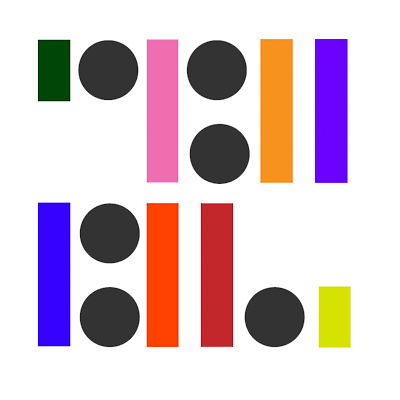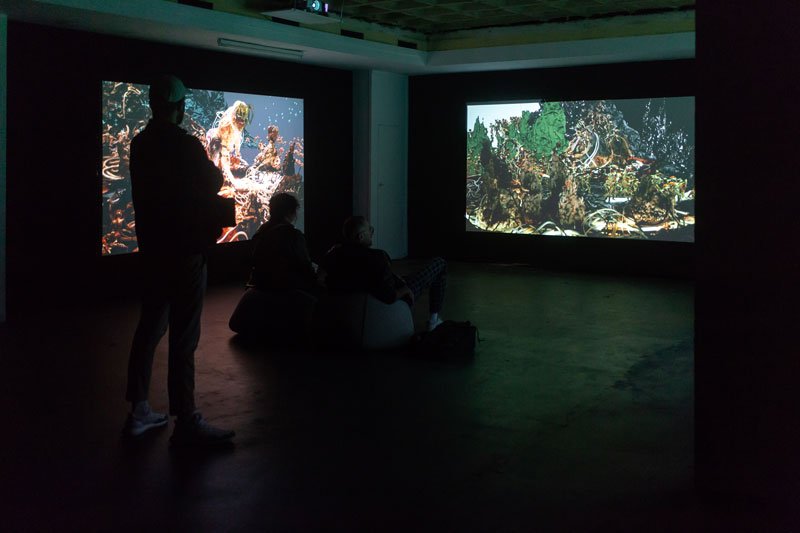On artists and economics in Berlin
Photo by Bianca at Gender Bender Time Traveller, Berlin 2022. Artwork by Andrew Thomas Huang.
Bianca Panozzo, a recent collaborator with School of Machines, with a background in production and management has been working locally with Berlin artists and organisations in the spaces of AI, VR, NFT, etc. over the last couple of years. In this time, she has made some valuable observations about the scene we feel are worthy of sharing.
Your background is in economics and now you’re working in the creative cultural field, can you tell us a little about that and what the former experience has taught you about the latter?
It was always clear to me that I am a creative person and need to lead a creative life in order to make sense of the world. Studying economics is something that happened because of the way I was raised and the expectations surrounding me at the time and, for a long time, I resented having made that decision: I wished I had dived into the arts earlier.
However, being now in my mid thirties and working with artists on a daily basis, I can see the value that having this background has since I find navigating around funding opportunities, budgeting and thinking about ways of monetizing artwork almost second nature. I find myself continually having conversations related to managing finances with artists, but this makes sense: most of them were taught how to make art and very little, if anything, about how to manage a business around the making of the art. Most creative courses of studies don’t give students solid financial and business tools, and this does a huge disservice to artists since understanding how money works is essential.
This does not mean turning into a capitalistic pig: it means having a knowledge base that allows you to feel more comfortable and confident when asking for and dealing with money, budgets and business opportunities. I have seen many projects crumble due to people thinking about money and planning with a sense of trust and almost a magical naivety or, even, as if it didn’t matter.
We are not having enough conversations around money and art, it is as if actually making money through art is even frowned upon, like you have “sold yourself to the devil”. But we live in this world, and the image of the starving artist needs to die: artists also pay rent, healthcare and food.
Artists often invest in acquiring more artistic skills which is, on the one hand great, but can also lead to complications if they are only narrowly focused on their art creation. How do you see it?
We tend to make sense of the world through the lenses with which we feel more comfortable with, and that we know best. If an artist, or any person with a project in mind for that matter, has little background on finances, promotion, budgeting, goal setting and business - they will find it harder to eventually think of that project in those terms. This, more often than not, leads to poor management of resources and long term planning which, in turn, can lead to stress, debt and a situation that doesn’t foster creative creation. And this is catastrophic because, as an artist, the goal is to have your life organized in such a way that making art is inevitable and not hindered by poor decision making.
Becoming a more skilled artist and working on our craft is as important as understanding how to navigate the world around us as seamlessly as possible. It is not a good idea to get so immersed in our creative work that we forget we live in a material world, as tempting as that might be. When the gods speak to us, we work, we create. When we are done, we come back to the material world and we organize, we plan. This is a decision we can make.
We should keep one foot on the water and one foot on the ground.
You have traveled and lived all around the world, how is Berlin different in terms of artist opportunities and mindset?
Berlin to me is retrofuturistic: sometimes I feel I’m living in 2075, sometimes that I’m back in the 1990’s and others, both at the same time. Sometimes I feel like there is a bubble that surrounds this city and filters what gets into it. To me, Berlin doesn’t follow the trends of the rest of the world in the way other big cities I have lived in do, like New York, Mexico City or Buenos Aires. Berlin is very much its own thing, even if it is changing, as all things do.
Berlin has more artistic opportunities than other places I’ve been in, especially in terms of collaborations and exposure to new ideas. It is impossible not to be changed by the “Berlin experience”: stay here long enough, and you will start questioning almost everything you thought was true, which is great for creative expression: finding new ways of looking at the world is what ignites great, innovative art.
At the same time, I also think there is a tendency here to still think of art as something that should not involve money. Maybe that was possible in the Berlin of the 1990s, but the world has changed: we now live in recession, inflation and war. The cost of living in this city is rising dramatically and that is something we cannot ignore.
We need to protect our art and our artists, since art is what catalyzes critical thinking. Maybe the way to protect them now is by paying them more.
Anything else you would like to add?
I need coffee and a hug, thank you.
****
To see more from Bianca, visit: https://www.instagram.com/darkanieves/
For more information and to sign-up for Professional Development for Artists, a two-day workshop from Michele Walther taking place 24. - 25. March at School of Machines in Berlin, click here.

